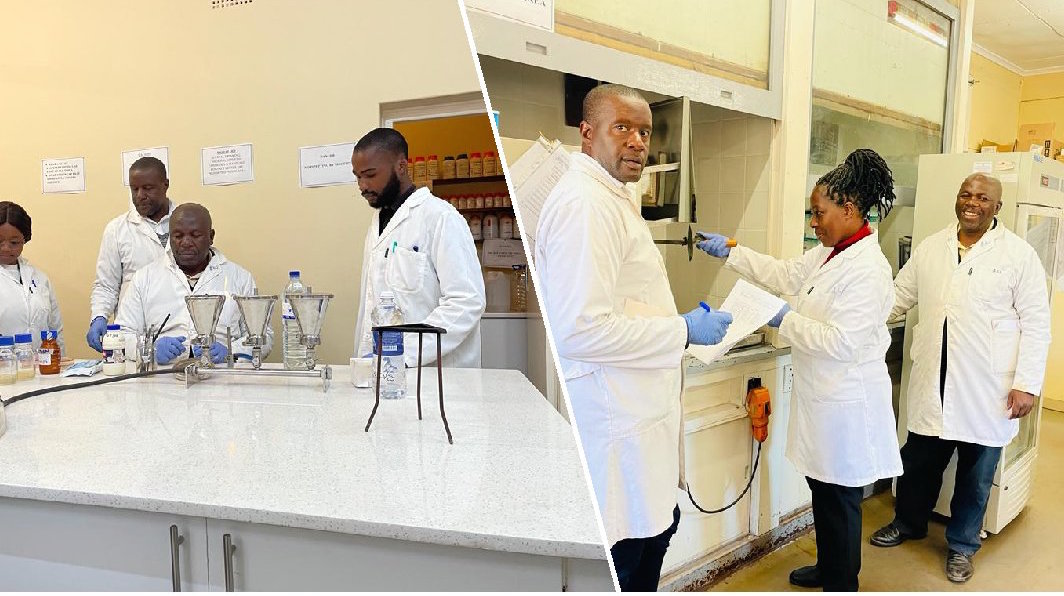|
Getting your Trinity Audio player ready...
|
The Government Analyst Laboratory (GAL) received the ISO/IEC 17025:2017 accreditation after a successful assessment by the Southern African Development Community Accreditation Service (SADCAS).
In a speech read on his behalf during the accreditation ceremony in Harare today, Zimbabwe’s Secretary for Health and Child Care, Air Commodore, Dr. Jasper Chimedza said the Government Analyst Laboratory (GAL) adopted ISO/IEC 17025:2017 a Quality Management System for Analytical and Testing Laboratories in 2019.
He said the lab improved its capacity through capitalization and training and now can provide its clients with exceptional services and ensure their satisfaction. It analyses all submitted food and water samples to ensure food safety and assist with combating cholera among other enteric diseases. It is battling to clear a backlog of nearly 1 500 deceased cases for toxicology analysis dating back a few years. With a focus on putting its customers first, GAL has worked tirelessly to build a strong relationship of trust with them.
Accreditation is the process of providing recognition to an organization for its competence in performing specific tasks. It involves the assessment of the technical competence of organizations in providing conformity assessment service(s). It involves conformity assessment of services which includes testing, certification (management systems/product/personnel), and inspection. It also applies to calibration laboratories, proficiency testing, and the production of certified reference materials. It is a tool for providing for the acceptance and recognition of conformity assessment results.
Accreditation provides increasingly accepted results worldwide in a transparent, and non-discriminatory manner to assure competency of conformity assessment service providers for both voluntary and regulatory areas.
It eliminates the need for repetitive testing, certification, and inspection. It provides a reliable and impartial basis for sound decision-making. It is a means of demonstrating competency to one’s clients. It is an effective marketing tool for one’s guarantee of reliable and comparable conformity assessment results and increases the reliability of products.
“The achievement of ISO accreditation by GAL is a testament to its commitment to quality management systems in compliance with NDS1 as we move towards an upper middle-income society by 2030. With this achievement, Government Analysts’ customers can rest assured that they are receiving services of the highest quality and that GAL is dedicated to continuously improving its processes to meet the client’s evolving needs.
“This achievement reinforces the Ministry’s focus on maintaining high quality that meets global standards and underscores its position as a leading regional provider of analytical services. GAL and indeed the Ministry of Health and Child Care are grateful to FAO for the sponsorship under the SAFE project that funded the accreditation process and this ISO Certification Handover Ceremony,” Dr. Chimedza said.
In a speech delivered on his behalf, the FAO Representative in Zimbabwe and Sub-regional Coordinator for Southern Africa at the Certificate Handover Ceremony in Harare said the recognition is important to the Food Control System of Zimbabwe.
“Thanks to the support from the European Union Delegation through the Transforming Zimbabwe’s Animal Health and Sanitary and Phytosanitary (SPS)/Food Safety Systems for the Future -SAFE Project- under the Zimbabwe Agriculture Growth Programme (ZAGP).
“In the Agri-food Systems approach, we say, if it is not safe it is not food, and the Government Analyst Laboratory comes in handy as a regulatory and testing laboratory to scientifically scrutinise the safety of food, From Farm to Folk,” the FAO Representative said.
In solidarity with the government of Zimbabwe and other key stakeholders, FAO is committed to supporting efforts towards ensuring food safety for all people at all times. Its global mandate tasks stakeholders with the responsibility of supporting all its member countries to ensure food safety as a key tenet for improving food security and nutrition.
Food-borne illnesses exacerbate nutrient deficiencies and food-borne parasitic infections have huge social and economic costs, particularly in developing countries like Zimbabwe.
Food safety cannot be taken for granted and in the United Nations’ “2030 Agenda for Sustainable Development” Food safety is integral to food security (SDG2), to health and wellbeing (SDG3) and to economic security (SDGs 1 and 8). According to the World Health Organisation 600 million people fall ill and 420,000 die globally every year after eating contaminated food, and surely, these are alarming figures that cannot be ignored.
At the 1996 World Food Summit, the Heads of State and Government reaffirmed the right of everyone to have access to safe and nutritious food, consistent with the right to adequate food and the fundamental right of everyone to be free from hunger. To achieve this commitment, agrifood systems have been transforming to sustainably deliver safe and nutritious food for all.
It is through the European Union-funded and FAO-run SAFE Project under the Zimbabwe Agriculture Growth Programme (ZAGP) that the Government Analyst Laboratory received support for ISO accreditation. The laboratory is now accredited to ISO 17025 of 2017.






